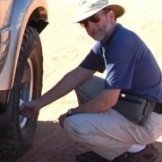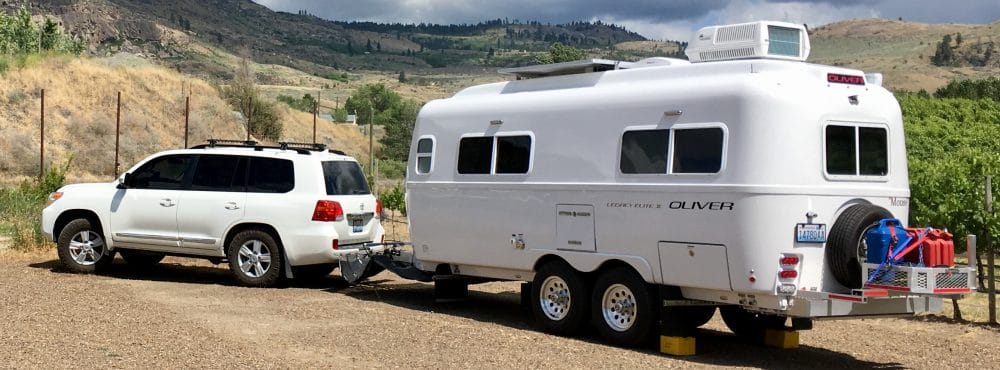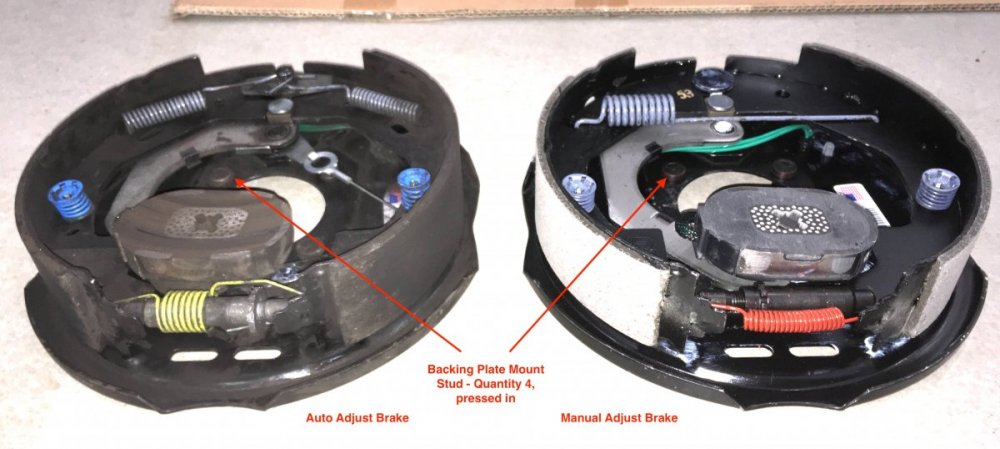-
Posts
5,759 -
Joined
-
Last visited
-
Days Won
243
Everything posted by John E Davies
-

Boondocking... Maps are your Travel Agent
John E Davies replied to BoondockingAirstream's topic in Ollie Boondocking
Hi Mike, yes, the main advantage of such apps is that you can download maps when you are at home using high speed wifi, so when you are in the boonies, the data is already there and ready for use, there is no need whatsoever for a cell signal with its expensive cellular data. Cellular driven nav apps like Google Maps work OK when you can connect. When the phone goes dead you need to have other map data to use. If you are using a tablet like an iPad, it must have a cell chip, otherwise the gps tracking doesn’t function. OTH, Pocket Earth has Wikipedia data (links) that you can download. When in cellular range you can click an icon and get an immediate summary of the point of interest. It saves time since you don’t have open up a browser and search for it. John Davies Spokane WA -

How tall is your RV and Its load?
John E Davies replied to Geronimo John's topic in Submit Your Story
Mine has an Atwood Air Command ac which is fairly short and I use 9’6” as a “No Go” number. I made a placard with this and the height of my TV with roof rack installed, and added it next to the rear view mirror, for easy reference. Keep in mind your trailer height will vary depending on the trailer load, tire pressure, the angle of the frame and also with any dips or rises in the road surface. A deep dip may throw the back way up when your TV rear tires drop into it. Always add a little extra clearance for insurance....! John Davies Spokane WA -

Boondocking... Maps are your Travel Agent
John E Davies replied to BoondockingAirstream's topic in Ollie Boondocking
I do not care for the Delorme atlases, I find them to be WAY less useful (recreationally) than the Benchmark ones. Unfortunately there are only 13 western states available. I have all of them except for Texas and Alaska. https://www.benchmarkmaps.com/atlases However, they are a great tool for research and a final backup in case my electronic devices fail. I use 1/4” stick-on colored dots to mark points of interest and major turns. My iPad Mini 4 has a number of camping and nav apps on it. I have tried most and deleted many.... The one I most recommend is GAIA Premium ($40 annually) since the Layers function lets you add just about any kind of info, like Forest Service MVUM (Motor Vehicle Use Map) data, which will tell you where you can and cannot drive. I can’t stress enough how important this is. GAIA is OTH pretty rotten for simple road navigation. The other app I use all the time is Pocket Earth Pro. The basic app is free, the Pro upgrade is $5 and adds topographic maps. For just driving away from urban areas where your cell phone is dead, it is wonderful. The graphics are very pretty and the thing that sold it for me is the user adjustable font size. You can make the city and town labels almost any size you want, and they are dynamic. When you zoom out they get bigger too, so older eyes can easily read them. All other similar map apps I have tried do not have this feature. Map downloads are quick and simple and you can use the app anywhere in the world. GAIA is for really hard core users, Pocket Earth will be useful for anybody. Try it out, see if you agree. https://pocketearth.com/ That said, for routing on normal roads I use a Garmin RV gps. It is way better than the factory nav systems I have seen. Plus the maps are free and updated quarterly. My 2013 Toyota maps are pretty lame, and they cannot be updated without a very expensive trip to the dealer. John Davies Spokane WA -
Hi, this is often discussed. The options are varied, as are their initial cost and effectiveness. Search for topics about “gravel protection” and “rock chip” repair. It really is an “ounce of prevention” situation. Minimizing the damage before you depart is more satisfactory than paying a shop to repair stuff later (some of which, like frame erosion, may not be repairable at all.) At the very least you should have effective mud flaps on your tow vehicle, not the little factory ones. After that you can consider tire choice (tread design) and trailer protection. After reading some older discussions, post any specific questions here and we will be happy to help. We are headed to Alaska by road in the summer of 2021. John Davies Spokane WA
-

Truck Shopping and Cargo Weights
John E Davies replied to Mike and Carol's topic in General Discussion
I absolutely love the Gladiator but I think there is probably going to be some performance disappointment ahead. Welcome to Ollie Land. John Davies Spokane WA -
This is from the viewpoint of having enough payload for a heavy truck camper, but other than that, everything is completely valid. https://www.truckcamperadventure.com/diesel-vs-gas-for-truck-camper-rigs-which-is-better/ The reader comments are also interesting. One thing about a (big) turbo diesel engine that not many consider, is that they are so very relaxing to the passengers on a long road trip. Especially when encountering stiff headwinds and steep grades. No worries Mate. John Davies Spokane WA
-

Dexter Axle BULLETIN Reference # 1ZP9-ABC12-19
John E Davies replied to BackofBeyond's topic in Mechanical & Technical Tips
Use whatever drive size you like, Dexter will never know and I promise that I won’t tell them. Most torque wrenches are most accurate in the middle of their range. They are way less accurate at the extreme ends. If your 3/8” drive wrench goes up to say 125 ft lbs, no worries. Those instructions are just rough guidelines. BTW a HF Pittsburg brand 3/8” wrench reads from 5 to 80 ft lbs. Their 1/2” is from 20 to 150 ft lbs. Their bigger one would be the most accurate in this case for a torque of about 70 ft lbs.. But if you only have the smaller one, use it. No need to go out and buy the bigger one. (Which is ideal for the lug nuts.) Cheap tools are pretty inaccurate, so I suggest that if you have a $20 wrench, use the middle of the recommended torque range. John Davies Spokane WA -

Dexter Axle BULLETIN Reference # 1ZP9-ABC12-19
John E Davies replied to BackofBeyond's topic in Mechanical & Technical Tips
If the angle is under 15 degrees the error can be ignored. For larger angles the torque will be less. No worries in this situation..... John Davies Spokane WA -

Dexter Axle BULLETIN Reference # 1ZP9-ABC12-19
John E Davies replied to BackofBeyond's topic in Mechanical & Technical Tips
I think the problem is not so much that parts will fall off, more that the brake will start to act weird, binding and locking up possibly. I would like to see more official information about “secondary steps” beyond notifying Dexter for help.... If I find a nut loose and I tighten it, do I call it a day? Two nuts? Three? What if they are really falling-off-loose but I can torque them down satisfactorily? At what point does this become a real concern? What happens next if I find a nut that will not tighten, indicating a stud that is turning? Is it required that an RV tech do this recall? If a problem is found by an OWNER, will that affect Dexters response in any way? It would be good to know where the limits are. If a significant number of nuts are found loose I would want to pull the drum/ hub off completely to clean and inspect the backing plate for trauma - cracks or bending. (These parts can be subject to very violent torque effects, especially if you slam on the brakes at freeway speeds.) For those who want to have this done buy a shop, you could have a traveling tech come by your place of storage to perform the recall. Cost will be about the same as for an RV dealer but the hassle is way less, especially in winter. Google “mobile Rv service”. I used one last year to do the Inverter Service Bulletin and was very pleased. John Davies Spokane WA -

Truck Shopping and Cargo Weights
John E Davies replied to Mike and Carol's topic in General Discussion
That is a beauty. Did you get the standard or eTorque Hemi? Post some pics with your trailer attached please. John Davies Spokane WA -

Dexter Axle BULLETIN Reference # 1ZP9-ABC12-19
John E Davies replied to BackofBeyond's topic in Mechanical & Technical Tips
I replaced my front brakes only last year and the four NUTS were fine. I did not check the rears, I will do so this winter when I do a bearing repack. For anyone who has had their brakes replaced by a shop, this bulletin should not apply since the brake backing plates are held on with this hardware. Normally the entire units are swapped, not rebuilt. But it would not hurt to check all 16 anyway! The four nuts secure each plate, which has four pressed-in STUDS which are probably splined near the head, as are the suspension shackle bolts. Those studs should never, ever rotate! If they do the backing plate or assembly should be replaced IMHO. And brakes must always be replaced in pairs (on the same axle) so that stability during operation will not be affected. I don't know what Dexter says about this, they may be OK with simply driving out a loose stud and putting another in there. I personally would not trust it to remain tight. John Davies Spokane WA -
I could easily get 20 mpg on long open back country highways at 60 mph, without trying hard. That number dropped as speed went up. 2006 Ram 3500 Quad Cab SB 4WD, 5.9 Cummins, Leer canopy, 33" tires, 4.10 gears. Pre-emissions though, that will make a difference for later trucks if they regen often, which they may do if not under a load.... a tuner can help with this. BTW there can be mechanical problems that affect fuel economy that are not obvious, dirty injectors for example. I always use this fuel treatment, in all my vehicles and small engines. It is not snake oil and it can make any truck run better, especially a diesel. It is absolute black magic for the Power Stroke 7.3 and 6.0 with their trouble-prone garbage HEUI injectors. ... https://www.archoil.com/products/ar6200-fuel-treatment AR6200 addresses issues associated with poor quality diesel, including the accumulation of performance-robbing soot, to restore and maintain vehicle performance. AR6200 increases cetane and many users will also notice an increase in fuel economy (MPG). The DPF will be kept clean, resulting in less frequent regens. Turbo and emissions systems will also be kept free from excessive soot. I never drove the Ram without using that treatment, maybe that is what worked for me. Try it yourself and report back in six months. BTW, you did say under perfect conditions, so I assume we aren't talking about regular daily numbers, which is what the EPA numbers reflect. BTW also, I would rather this thread not dissolve into a general chat - can we try to keep it a little more closely on subject? Some questions really should have their own thread. Thanks. John Davies Spokane WA
-
We tried regular bottled water but it is truly a pain to store and also dispose of the many used bottles. Gallon jugs are a little better. It all generates a bunch of plastic waste. Last year this replaced the bottles. .... https://smile.amazon.com/Brita-36426-Everyday-Pitchers/dp/B07QD2CMWL/ref=sr_1_12?keywords=Brita+filter&qid=1576725119&sr=8-12 We use a stout clear plastic container (a 3 liter juice bottle) as a reservoir. We fill the filter with tap water from the sink and let it do its thing, it takes about 15 minutes. Pour the water into the other container, and refill the filter. The container fits in the fridge for cooling and transport. The Brita filter, empty, goes in the pantry top shelf. It just fits, vertically and rotated sideways. We do not travel with it there when it is full of water! The replaceable filter elements are good for 120 gallons or six months. I toss the used one in late Fall, clean and dry the filter housing and store it in the pantry until next season, when it gets a new filter element. This has proven to be effective and the water tastes fine. Not counting the initial cost for the Brita, it costs $12 for a full season of drinking/ cooking water for two people. A full timing couple would probably go through several filters..... John Davies Spokane WA
-

How Comfortable are you in Your Elite II ?
John E Davies replied to JPatrickJ's topic in General Discussion
You will bang your head, at first, exiting the cabin door. It has a padded cushion there, for that very reason.... You will also on occasion bang your head on the top of the bathroom doorway, it is a hard chrome strip with no padding. It can hurt enough to make you swear, but after that your won't do it again. Make sure you are not too tall for the bathroom, some folks over say 6 feet 3 inches will not be able to stand upright. That is a complete deal breaker for some tall buyers. The floor of the bathroom is raised about three inches above the main floor. If you get a chance to see the composting toilet, check the height, it may not work for a short person. We both sleep head to front. I immediately removed the fixed TV in our trailer because it was always in the way, over the foot of the curbside bed. The new center system will be fine. We have the (no longer offered) galley rear bulkhead, which stops cooking splatter from getting on the bedding and also forms a pillow backstop for that berth. The street side one uses the galley as the wall. John Davies Spokane WA -
16 mpg in a modern diesel HD pickup, unloaded at 60 mph would make me convinced that there is a mechanical problem, if it is completely stock (no big tires or lift). I used to get 22 mpg at times in my old Cummins 5.9 but it had no emissions. 20 mpg was fairly routine. You got to keep the pedal off the floor to get good numbers on the highway. Your friend can install a tuner and get much better drive-ability. He also needs a canopy or tonneau cover. John Davies Spokane WA
-

Winter Temps and pipe freezing
John E Davies replied to MarkC's topic in Mechanical & Technical Tips
If you are boon docking, you will indeed go through a whole bunch of propane, plus you are relying on a mediocre RV furnace to keep running. You can carry an extra gas bottle in your TV in case of an unplanned shortage; if the furnace quits completely due to a bad board or igniter, you will be in trouble quickly, and will need to get the Ollie to a place where you can plug in and run a couple of backup electric heaters. The systems work well enough considering their cost, but they not especially reliable, and they are grossly inefficient compared to a modern gas residential furnace. I haven't seen efficiency ratings for RV appliances, I would appreciate a link if someone can provide one... John Davies Spokane WA -

Truck Shopping and Cargo Weights
John E Davies replied to Mike and Carol's topic in General Discussion
Visiting a scale gives you real world figures, no doubt about it. OTH it is a bit of a pain and I would bet that most people never do it. I personally have stopped on "closed" truck scales along the freeway to read my own axle weights by looking through the office window, perhaps twice in 40 years..... I have never done it officially. If you have even a vague idea of what your stuff weighs, you don't need to scale weigh the rig.... it's just simple addition. Individually weighing parts of your truck using a bathroom scale, and stuff on your trailer, is sometimes eye opening. The two Third Row jump seats I permanently removed weigh 85 pounds, which happens to be the exact weight of the gennie I carry back there. The middle seats are even heavier but I rarely disturb them. My old Series 80 with lots of off-roady parts had an extra 600 pounds of stuff inside and out..... I try really hard to keep the 200 as svelte as possible. FYI I think a tongue weight scale (mine is a Sherline 1000 pound one) is a very important tool, one that most owner should use (or borrow). Unless they have a HD pickup, in which case it isn't essential for an Ollie, it just provides useful information... John Davies Spokane WA -
You need to post the specs, there is no way to tell otherwise. Tow rating, payload, axle ratio, tow package, etc...? This might help. https://www.trailerlife.com/wp-content/uploads/2012/01/Trailer-Life-Towing-Guide-2007.pdf ... Some of the 4.8 liter trucks had tow rating as low as 4700 pounds, which is not even enough for an Elite. Sad to say, but older pickups with small low powered engines just don’t tow very well... i am guessing it would be barely satisfactory (in Florida), until it isn’t. Like facing a 40 mph headwind, or a 12% grade and 100 degree heat. There is no reason at all to buy a brand new tow vehicle, you could replace it with a nice used HD truck and not be worried at all. John Davies Spokane WA
-
Really? My kitchen sink has no such vent. It drains poorly if the grey valve is closed (airlocks), plus it may burp noxious gases into the cabin through the trap during severe elevation changes. Plus my grey tank will drain slowly if the valve is closed and the kitchen sink is stoppered, since the big roof vent up front is not able to operate. There is a trap under the shower drain. All three traps must not be allowed to dry out through evaporation, or odors will get past those points. Just like in your home, they are there to retain water and keep the sewer pipe gases isolated from the air inside the dwelling space. Treating the grey tank (and the traps, during storage) with a deodorizer helps to stop the smells. As does being very picky about what you let go down into the tank. John Davies Spokane WA
-
That is very cool and I think the price is right. As a pure dirt play bike it will be a hoot. If idiots try to take them on regular bicycle only trails we will see a whole lot of destruction and bad feelings. If my body were younger and I had some acreage to ride on, I would put my deposit down. Thanks for posting. John Davies Spokane WA
-
Well, this topic is drifting into dangerous waters. Rather than commenting directly, and risking offending anybody, I will offer this article. https://motivatetherapy.com/is-it-normal-to-pee-and-poo-at-the-same-time/ That said, my wife had similar concerns about using the Natures Head toilet and those turned out to be completely groundless. I love this forum! John Davies Spokane WA
-

Truck Shopping and Cargo Weights
John E Davies replied to Mike and Carol's topic in General Discussion
This question is what the Brits called a “sticky wicket”. It is controversial. In theory, a percentage of the TW is transferred back to the trailer axles. How much will show up when you weigh your rig with no spring tension, immediately followed by re-weighing with spring tension. The difference, if any, should be obvious. Can somebody predict exactly how much? I doubt it. You should never rely on lightening the load in the TV by using a WD hitch, if you are that close to maxxing it out, or are over it, you need to either leave some stuff at home or buy a stouter vehicle. An Anderson does very well in two out of three functions. It stops sway (which isn’t generally applicable to most Ollies anyway), and deadens bounce really really well, but in my experience it is not actually that good at redistributing weight, compared to a big clunky spring bar system. http://www.airforums.com/forums/f238/weight-distribution-and-payload-ratings-160733.html Great question, it really deserves its own thread. I am sure others would like to comment. John Davies Spokane WA -
I thought it might be interesting to grade your own TV, along with any details about why.... Post basic mechanical details of your TV, plus the weight of your trailer if you know it. The grade is for towing an OLIVER, preferably in difficult conditions, not for other types of driving. Also post if you recommend the vehicle to a general Oliver buyer. 2013 Land Cruiser 5.7, 6 speed (two gears are overdrive and not usable in towing), 3.90 axles, 33" LT tires, rear airbags, 130K miles. 5730 pounds curb weight, 8300 pounds tow rating, 850 pounds max tongue (dead weight or equalizing hitch). Oliver LEII about 6000 pounds. Tongue weight 500 pounds. Air pressure 35 psi. Andersen hitch. TV rear airbags set to 12 psi for leveling. Grade C. Poor mpgs (10-12 towing, 16 to 17 empty), poor range (25 gallon tank), short wheelbase requires Andersen hitch for stability, not enough gears. Struggles on steep, high mountain passes (partly this is due to "Plus 2" tire sizing). Lack of cargo space and payload. Other than that I absolutely love everything about it, but I put up with the minuses so I can Explore More off pavement and in the mountains. If I installed a used set of Tundra 4.30 ring and pinion gear sets (about $2000, giving an 11% increase in torque), that would definitely solve the performance issue, plus maybe increase the fuel economy a little. If I towed an Elite, I would have no worries, I could dump the WD hitch, and the grade would probably change to a B. Recommended? NO. Please post your score. BTW, is there any way to post a Poll in this forum? John Davies Spokane WA
-
I would not recommend a Highlander, it doesn't have any real reserves in terms of capacity. What does your trailer actually weigh, loaded for a long trip? How much "stuff" do you carry - especially heavy gear like generator, bikes, tools, cast iron cookware, ammo, etc etc? Where will you plan to tow and do you plan any really long trips? I would be looking at a vehicle with a 6500 pound or higher tow capacity plus a decent payload. If you want to stay with a Toyota SUV, a Sequoia (5.7 liter engine) would tow your trailer as if it were not there, though you will pay for fuel; the V8 is thirsty. Plus the Tech is simply not there.... it is due a refresh. If you are OK with other brands of SUVs, there are much better choices. John Davies Spokane WA
-
Please tell us how this ended.... John Davies Spokane WA





